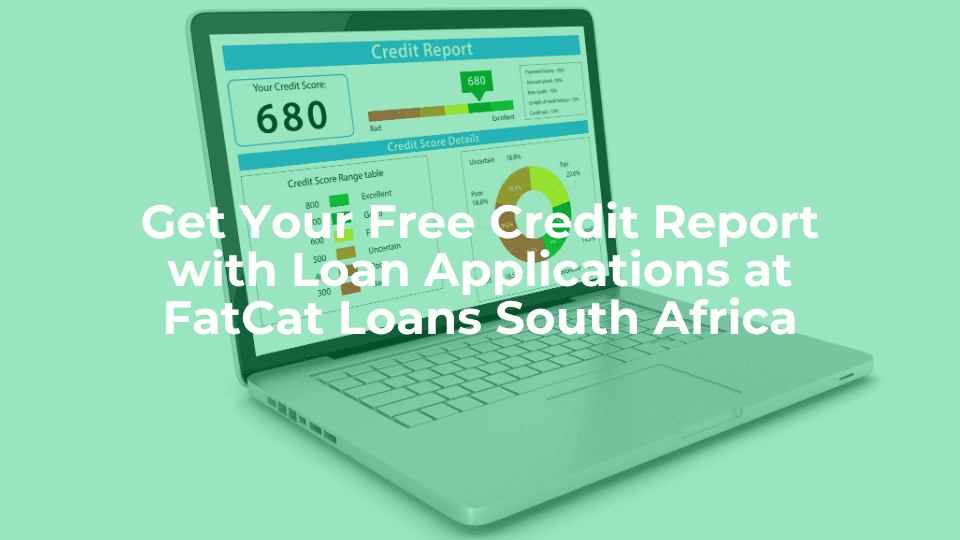What’s the Advantage of a Free Credit Report with Loan Applications at FatCat Loans South Africa
Are you a South African tired of hidden fees, complicated processes, and uncertainty about your financial standing? In today’s fast-paced economy, understanding your credit health is more crucial than ever. That’s why FatCat Loans is revolutionizing the lending landscape with an unbeatable offer: a free credit report for every customer who applies for a loan on our website. Yes, you read that right—no extra costs, no strings attached. Simply start your loan application at FatCat Loans, and we’ll provide you with a comprehensive credit report to empower your financial decisions.
This isn’t just a perk; it’s a game-changer. With South Africa’s credit bureaus like TransUnion, Experian, and XDS holding vast amounts of data on millions of consumers, accessing your credit report can reveal judgments, defaults, payment histories, and your overall credit score. But why pay R100 or more for a standalone report when you can get it for free alongside a tailored loan option? At FatCat Loans, we’re committed to transparency and accessibility, helping you borrow smarter in a country where over 50% of adults face credit challenges, according to recent National Credit Regulator (NCR) reports.
In this in-depth guide, we’ll dive into everything you need to know about this free credit report offer. From understanding what a credit report entails to the step-by-step process of applying for a loan and claiming your report, we’ve got you covered. Whether you’re in Johannesburg, Cape Town, Durban, or anywhere else in Mzansi, this opportunity is designed for everyday South Africans like you—salaried workers, freelancers, or those rebuilding after tough times. By the end, you’ll be equipped to take control of your finances and potentially unlock better loan terms. Let’s get started on your path to financial clarity!
What Exactly Is a Credit Report, and Why Does It Matter in South Africa?
Before we jump into the free offer, let’s break down the basics. A credit report South Africa is essentially a detailed snapshot of your creditworthiness. Compiled by accredited credit bureaus under the National Credit Act (NCA) of 2005, it includes:
- Personal Information: Your name, ID number, contact details, and employment history.
- Credit Accounts: Details on loans, credit cards, store accounts, and mortgages—active, closed, or overdue.
- Payment History: Records of on-time payments versus late or missed ones, which heavily influence your credit score.
- Enquiries: Recent hard inquiries from lenders checking your credit, which can temporarily ding your score if excessive.
- Adverse Listings: Judgments, sequestrations, or defaults that signal risk to potential lenders.
- Credit Score: A numerical value (typically 0-999) indicating your reliability; higher scores mean better rates.
In South Africa, where unsecured loans average R5,000 to R250,000 and interest rates can soar above 20% for poor credit, this report is your financial X-ray. The NCR mandates that consumers can access one free report annually from each bureau, but chasing these individually is time-consuming and often overlooked. Enter FatCat Loans’ innovative twist: integrate it seamlessly with your loan application.
Why does it matter? Poor credit can lock you out of affordable borrowing, leading to a cycle of high-interest debt traps. According to a 2023 DebtBusters study, 62% of South Africans have impaired credit records, exacerbating inequality. A free credit report lets you spot errors (like incorrect listings, which affect 1 in 5 reports), dispute inaccuracies, and track improvements. For instance, paying off a small debt can boost your score by 50-100 points within months. When applying for a personal loan South Africa, knowing your score upfront helps you negotiate or choose lenders wisely—saving thousands in interest over time.
Moreover, in an era of economic volatility—think load shedding’s impact on businesses or rising fuel costs—this tool promotes proactive money management. Imagine applying for a R10,000 emergency loan and discovering a fixable error that qualifies you for a lower 15% APR instead of 25%. That’s the power FatCat Loans is handing you for free. No more guessing games; just data-driven decisions that align with your goals, be it funding education, home repairs, or debt consolidation.
The Game-Changing Benefits of a Free Credit Report with Your Loan Application
At FatCat Loans, we don’t just lend money—we lend knowledge. Pairing a free credit report with loan applications isn’t a gimmick; it’s a strategic move to democratize finance. Here’s why this offer stands out:
- Cost Savings Galore: Standalone credit reports from bureaus like ClearScore or CreditSmart cost R50-R200. By bundling it free, we eliminate that barrier, especially for low-income households where every rand counts.
- Timely Insights: Traditional reports lag by 30-60 days. Ours pulls real-time data during application, giving you the freshest view. Perfect for urgent needs like medical bills or vehicle repairs.
- Holistic Financial Health Check: Beyond loans, use it to vet rentals (landlords check credit), job applications (some employers do too), or even cellphone contracts. It’s a multi-tool for life.
- Privacy and Security First: We comply strictly with POPIA and NCA, ensuring your data stays encrypted. No spam follow-ups—just your report and loan options.
- Tailored Loan Matching: Your report informs our algorithms, matching you to loans that fit your profile. Good score? Enjoy rates from 12%. Building credit? Access starter products with flexible terms.
Consider Thabo, a 32-year-old teacher from Pretoria. Facing unexpected car repairs, he applied at FatCat Loans and received his free report revealing a minor default from a forgotten store card. He disputed it on the spot, secured a R15,000 loan at 14% interest (saving R2,500 vs. standard rates), and paid it off early. Stories like his highlight how this offer breaks debt cycles, fostering long-term wealth.
Economically, it’s a win for South Africa too. Empowered consumers borrow responsibly, reducing non-performing loans that burden banks and the economy. With inflation at 4.5% in 2025 and unemployment hovering at 33%, tools like this bridge the gap between aspiration and reality.
How to Apply & Get Your Free Credit Report in 5 Easy Steps
| Step | Action | Time Required | Key Benefit |
|---|---|---|---|
| 1. Visit & Start | Go to FatCat Loans → Click “Get My Quote” → Enter ID, income & contact | 2–3 mins | Fully online — no branch visits |
| 2. Authorize Report | Tick consent box → Get instant credit report preview | 10 seconds | Real-time score & insights |
| 3. View Loan Offers | See personalized loan options based on your score | 1 min | Rates from 12% (good credit) |
| 4. Submit & Approve | Upload selfie + bank proof (if needed) → 60-second approval | 1–2 mins | Same-day pay-out via EFT |
| 5. Receive & Improve | Free full report emailed + access tools to boost score | Instant | Keep report even if you don’t borrow |
Why Choose FatCat Loans for Your Next Borrowing Need?
Beyond the free credit report, FatCat Loans shines with customer-centric features. We’re 100% online, serving all provinces with no hidden charges. Our average approval rate? 85%, thanks to inclusive criteria. Plus, partner with us for extras: financial literacy courses via app, referral bonuses (R200 credit per friend), and eco-friendly initiatives like tree-planting per loan.
In a market crowded with payday lenders charging 5% monthly fees, we cap at NCA limits, ensuring sustainability. Testimonials flood in: “FatCat’s free report saved me from a bad decision—got approved for half the interest!” says Sipho from Soweto.
Frequently Asked Questions (FAQs) About Free Credit Reports and Loan Applications
Got questions? We’ve compiled the top ones based on customer queries.
1. Is the free credit report really free, or is there a catch?
Absolutely free—no fees, no obligations. It’s our way of building trust. You only pay if you accept a loan, and even then, transparently.
2. How often can I get this free credit report offer?
As many times as you apply, but bureaus limit full reports to once per year per agency. We rotate bureaus for freshness.
3. What if my credit score is low—will I still get a loan?
Yes! We specialize in bad credit loans South Africa, with options to rebuild. Your report helps us customize.
4. How long does the entire process take?
From application to report and approval: under 10 minutes. Funds in 1-2 hours.
5. Is my information safe with FatCat Loans?
100%. We’re POPIA-compliant, using bank-level encryption. No selling data—ever.
6. Can I apply without a steady job?
Freelancers and informal workers qualify with proof of income. Minimum R3,000/month.
These FAQs address 90% of concerns, but chat our 24/7 support for more.
Ready to Unlock Your Financial Future? Apply Today!
Don’t let credit mysteries hold you back. With FatCat Loans’ free credit report offer, you’re one click from clarity, funding, and freedom. Visit FatCat Loans now, apply in minutes, and step into a brighter tomorrow. Whether it’s R5,000 for groceries or R50,000 for dreams, we’ve got you. Apply today—your free report awaits! Secure, simple, South African strong.

The FatCat Loans Editorial Team delivers clear, accurate, and unbiased guidance on loans, credit, and personal finance in South Africa. Our writers follow strict editorial standards to ensure every article is trustworthy, well-researched, and easy to understand, helping readers make confident financial decisions.














